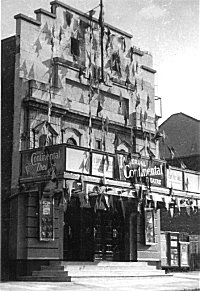Bill's interest in cinema began at an early age. At the age of seven, he and a friend
found a magic lantern in a dustbin in Stanley Road and used it to show
films in the garden shed.
He left Broadway School at the age of 14 to work in a mineral water
factory but he really wanted to work in the cinema. After working at weekends for the Five
Star cinema company he became a trainee projector operator then later chief
projectionist at the Astoria Cinema (now occupied by Status Alarms) in
Albany Road.
 |
THE CONTINENTALE -
DECORATED FOR THE 1950's
PREMIERE OF 'THE MAN IN WHITE'
[photograph courtesy of Mrs Edkins] |
After the war he took charge of the Imperial Cinema in Earlsdon
Street (on the site where Rolfe's now stands), which had been damaged by a bomb in 1940.
With the growing competition of television in the 1950s, when many cinemas closed, he took
the bold decision to rename the cinema La Continentale, specialising in
foreign language films.
The venture proved a considerable success until the general decline in the industry
overtook it, forcing its closure in 1963, after a short period as a members-only cinema
club, the Moulin Rouge. Bill later worked at another Coventry cinema,
then at the age of 55 became an audio-visual technician at Henley College.
His interest in the cinema continued unabated and he and his wife spent their holidays
visiting all the famous film studios all over the world. They celebrated their golden
wedding in Hollywood and for his 80th birthday in 1997 they
visited the MGM, Universal and other studios in the United States.
Bill was keen to interest others in his passion and helped the VJ 50th
anniversary street party celebrations in Palmerston Road on 3 May 1995 by showing
a film of the original VJ parade in 1945, as well as supplying the music for the party.
However, his lasting legacy is likely to be the book that he spent ten years compiling
- 'The Silver Screens of Coventry' - which covers the period 1896-1996.
As well as a memoir of his working life in the movies it is a comprehensive history not
only of the cinema buildings but also of the pioneers who built them and of the evolving
technical background in which they operated. His encyclopaedic knowledge makes the book
invaluable and although it has not been published there are plans for a copy to be
deposited at the City Record Office, for the benefit of present and future generations of
cinema lovers.
Bill was so fanatical about films that he built his own curved screen, designed to
accommodate Cinemascope, in the front room of his house and collected a
huge number of items about the cinema, including tickets, programmes and press cuttings.
During his final illness he was still thinking about the movie world, as his widow, Peggy
recalled: